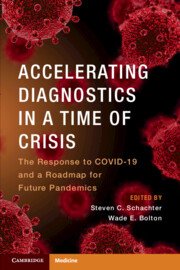Actionable Lessons from the NIH “RADx” Initiative
Episode 177 of the Global Medical Device Podcast, host Jon Speer and Devon Campbell examine the groundbreaking Rapid Acceleration of Diagnostics (RADx) initiative, a visionary project initiated by the National Institutes of Health (NIH). RADx was designed to fast-track the development, commercialization, and deployment of cutting-edge COVID-19 testing technologies, with a focus on reducing viral detection cycles and enhancing widespread access to reliable testing.
Devon shares personal lessons learned while actively supporting RADx teams in their tireless efforts throughout the pandemic, distilling five actionable lessons that can be seamlessly applied by medical device companies to drive innovation and success across the industry.
At the heart of the episode lies a comprehensive exploration of the RADx initiative, which stands as a beacon of innovation in the realm of diagnostics. RADx, spearheaded by the National Institutes of Health (NIH), was a transformative endeavor with the explicit goal of revolutionizing the landscape of COVID-19 testing.
This visionary initiative sought to expedite the development, commercialization, and implementation of advanced testing technologies. By shortening viral detection cycles and broadening access to accurate testing solutions, RADx will play a crucial role in shaping the future of pandemic response.
Want to learn more? Devon Campbell and Christie Johnson authored a chapter in the book Accelerating Diagnostics in a Time of Crisis: The Response to COVID-19 and a Roadmap for Future Pandemics which goes into much more detail. Available 2024
“Those who responded to the COVID-19 pandemic have now had the opportunity to reflect on lessons learned, and in this science and data-rich book, those reflections are presented as a behind-the-scenes chronology of events and discoveries that occurred in COVID-19's wake. Offering a rubric for a future pandemic response, each chapter is written by experts, with their unique perspectives, experience, and learnings woven into visual roadmaps throughout the book. These roadmaps serve as a scaffolding upon which future healthcare leaders can build when creating, implementing and executing operational strategies in the face of future infectious disease outbreaks. Written for both lay and scientific audiences and featuring case studies which give clinical insight into the unique bond between COVID patients, their loved ones and their healthcare providers, this important book allows readers to leverage the knowledge of experts to improve the outcomes of future pandemics.”
- Cambridge University Press

